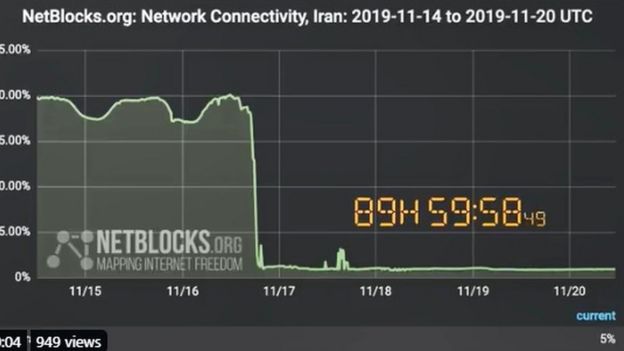(FASTNEWS | COLOMBO) – A country of 80 million people – and practically no way to get online. Iran’s internet shutdown has lasted for four days now, sparking international concern.
Following protests over a sharp increase in fuel prices in the country, internet connections began to go dark beginning late on Saturday night, local time.
On social media, Iranians living or travelling abroad have shared stories of being cut off from their families and friends back home.
Many are still waiting for news of their welfare.
Alp Toker at internet-monitoring non-profit NetBlocks watched it unfold.
“We detected fluctuations in regional connectivity,” he tells the BBC.
“This extended towards having national impact by later in the evening.”
Since then, internet traffic in the country has plummeted to 5% of normal levels, according to NetBlocks.
NetBlocks tracks connectivity in countries around the world by scanning the internet for communications devices – routers, servers, mobile phone towers – and keeping a database of those known to be online in each territory.
By periodically sending brief messages over the internet to these devices, a practice called “pinging”, NetBlocks and similar organisations can see when they go offline.

Mr Toker says he is taken aback by the extent of the blackout in Iran: “This is on a different scale to other instances we’ve seen around the world.”
He points out that the internet system in the country is not a single network that is easy to switch on or off.
Rather, a bit like in the UK, it is formed of a series of privately-owned networks that link together. Disrupting such a system is not straightforward.
However, connections to the outside world in Iran are funnelled through just two entities: the state telecoms firm and the Institute for Physics and Mathematics, which means that authorities are more easily able to block communications in and out of the country.
“If you architect your country’s internet access so you control the gateways, i.e. create choke points, you can censor at will,” says Prof Alan Woodward, a cyber-security expert at the University of Surrey. (Courtesy: BBC)



